|
|
|
Sort Order |
|
|
|
Items / Page
|
|
|
|
|
|
|
| Srl | Item |
| 1 |
ID:
173464
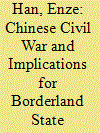

|
|
|
|
|
| Summary/Abstract |
Few studies on the legacies of the Chinese Civil War have examined its effects on state consolidation in the borderland area between China and mainland South-East Asia. This paper empirically examines the impact of the intrusion of the defeated Kuomingtang (KMT) into the borderland area between China, Burma and Thailand. In the People's Republic of China (PRC), the presence of the US-supported KMT across its Yunnan border increased the new communist government's threat perceptions. In response, Beijing used a carrot-and-stick approach towards consolidating its control by co-opting local elites while ruthlessly eliminating any opposition deemed to be in collusion with the KMT. In the case of Burma, the KMT presence posed a significant challenge to Burmese national territorial integrity and effectively led to the fragmentation of the Burmese Shan State. Finally, in Thailand, Bangkok collaborated with the Americans in support of the KMT to solidify its alliance relations. Later, Thailand used the KMT as a buffer force for its own border defence purposes against a perceived communist infiltration from the north. This paper contextualizes the spill-over effects of the Chinese Civil War in terms of the literature on how external threats can potentially facilitate state consolidation.
|
|
|
|
|
|
|
|
|
|
|
|
|
|
|
|
| 2 |
ID:
112869
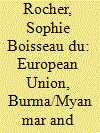

|
|
|
|
|
| Publication |
2012.
|
| Summary/Abstract |
The recent events in Burma/Myanmar, beginning with the November 2010 elections and the subsequent series of reforms, have taken Europe by surprise. For the last 20 years, the European Union (EU) has been one of the most vocal critics of the junta regime, thus jeopardising its constructive relations with the Association of Southeast Asian Nations (ASEAN) and its members. In a new context of transition, the EU has to show that it can quickly adjust to an unanticipated scenario if it does not want its credibility to remain deeply undermined in a regional space that is undergoing structural transformations. Europe and ASEAN should together find a way to consolidate both the socio-political transitions in Southeast Asia and the validity of European values.
|
|
|
|
|
|
|
|
|
|
|
|
|
|
|
|
| 3 |
ID:
144913
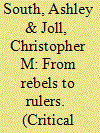

|
|
|
|
|
| Summary/Abstract |
This article presents a critical comparison of the ongoing peace processes in the southern Philippines and Myanmar (Burma). It does so by examining two key armed groups: the Moro Islamic Liberation Front (MILF) on Mindanao, and the Karen National Union (KNU) in Myanmar. We identify common elements that help to explain the relative – albeit incomplete – success of these two groups in navigating their respective peace processes. The MILF and KNU are ethnonationalist armed groups struggling for self-determination against states that are experienced by ethnic minority communities as culturally alien, and economically and politically dominant. Both conflict actors are characterized by complex combinations of “greed” and “grievance” factors but nevertheless enjoy significant (albeit contested) political legitimacy among the communities they seek to represent. We explore the complex relationships between armed ethnic groups, conflict-affected communities, and civil society actors. We argue that engagement with civil society is a key element of success in the Mindanao peace process, which could be replicated in Myanmar. We examine the roles and changing nature of the state in the Philippines and Myanmar, and contrast the degrees of international involvement, as key variables in these peace processes. We observe that negotiations of comprehensive peace settlements are threatened by “the tyranny of elections” in Myanmar (2015) and the Philippines (2016), and observe the importance of including national parliaments in peace processes in a timely manner. The peace process between Manila and the MILF represents a rare example of a Muslim minority pursuing its political objectives through structured dialogue. The article focuses on the challenges faced by armed groups moving from insurgency to reinvent themselves as credible political actors and governance authorities. Our analysis draws on peace-building literature, specifically the phenomenon of “rebel governance.”
|
|
|
|
|
|
|
|
|
|
|
|
|
|
|
|
| 4 |
ID:
139665
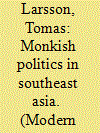

|
|
|
|
|
| Summary/Abstract |
In the Theravāda Buddhist polities on the mainland of Southeast Asia, abiding concerns about the proper structuring of the relationship between the ‘two wheels of dhamma’ (i.e. the realm of religion and the realm of politics) have had a profound influence on processes of state formation and political legitimation. This article explores one such religious ‘effect’ on the constitutions and electoral laws of modern Burma/Myanmar, Siam/Thailand, Cambodia, and Laos, namely the official disenfranchisement of Buddhist monks (and, in some instances, Buddhist ‘nuns’ as well as non-Buddhist clergy). The article traces the historical evolution of this Buddhist exception to the democratic principle of equal and universal suffrage, and assesses the extent to which dominant theoretical approaches in the social sciences help us to understand the politics of religious disenfranchisement in Southeast Asia. It finds that neither secularization theory nor the religious-economy approach can explain observed patterns. Instead, the article offers an account of the politics of religious disenfranchisement that emphasizes the role of ideas and historical context.
|
|
|
|
|
|
|
|
|
|
|
|
|
|
|
|
| 5 |
ID:
181034
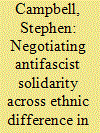

|
|
|
|
|
| Summary/Abstract |
The 1989 collapse of the Communist Party of Burma through rank-and-file mutiny, and its splintering into manifold ethnic armed organizations, presaged a weakening of prospects for any leftist project across ethnic lines in Myanmar. These developments coincided with the flourishing of so-called new wars, in Myanmar and elsewhere, organized around identity politics rather than ideology. For liberal critics, such developments confirmed a belief that leftist projects could only ever be an authoritarian imposition over ascriptive ethnic difference. Considering such critiques, this article presents an alternative approach to leftist politics in Myanmar, as advanced by author and journalist Bhamo Tin Aung in his 1963 novel, Yoma Taikbwe, which narrates the emergence of antifascist struggle under wartime Japanese occupation. The book articulates a leftist politics that attends to ethnic difference as an experience grounded in uneven political economy, thus paralleling arguments from the Black radical tradition. In this way, Bhamo Tin Aung pointed to a leftist politics realized through negotiation across difference. It is a politics that remains as pertinent as ever, given worsening class inequality and enduring ethnic chauvinism, in Myanmar and elsewhere, and given the importance of cross-ethnic solidarity in the struggle against military rule following Myanmar’s February 2021 coup.
|
|
|
|
|
|
|
|
|
|
|
|
|
|
|
|
| 6 |
ID:
139395


|
|
|
|
|
| Summary/Abstract |
While scholars have spent a good deal of time examining mediation processes, we know very little about unassisted negotiations in the midst of civil disputes. One of the primary goals of this research is to examine the factors that can bring about negotiations aimed at addressing core, underlying issues that brought about armed struggle. In order to do so, a comparative case study of Southeast Asia is presented. We find that unassisted negotiation of core issues can occur in intrastate rivalry under certain conditions. Interestingly, such efforts are unlikely to be won on the battlefield, but rather emerge following regime change or once mediation has paved the way for key issues to be addressed. Negotiations following regime change, while they tend to occur and involve core issues, continue to be influenced and challenged by the legacy of previous resolution efforts and historical memory.
|
|
|
|
|
|
|
|
|
|
|
|
|
|
|
|
| 7 |
ID:
161587
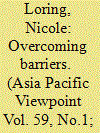

|
|
|
|
|
| Summary/Abstract |
Myanmar's 2015 elections have been credited with bringing about a myriad of changes within the country. Much has been written about the changing political climate within Myanmar. One topic which has not yet been discussed adequately, however, is the role of Burmese women in these recent elections. This paper seeks to examine women's political participation in Myanmar's recent move towards democratisation. Using rates of female candidacies in Burmese elections, comparing these figures with rates of female participation in other Southeast Asian countries, and ethnographic research with the Burmese voting public, this paper will contribute to the sparse scholarship regarding the role of women in new democracies and regime transitions. This paper finds that beliefs about traditional gender roles, rooted in traditional Buddhism, still shape the way both men and women in Myanmar view women's political participation. While women are better represented in Myanmar's government than they were in the past, this paper suggests that measures such as quotas or reserved seats based on gender may be the best way to increase Burmese women's political representation in the future.
|
|
|
|
|
|
|
|
|
|
|
|
|
|
|
|
| 8 |
ID:
145852
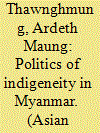

|
|
|
|
|
| Summary/Abstract |
This paper addresses a key issue that remains under-studied in discussions of Buddhist–Muslim hostility and violence in the northern Rakhine state in Myanmar. It reveals how the public narratives of both Rakhine Buddhist and Muslim political parties rely on the concept of ‘indigeneity’ to assert their claims as citizens and rightful sons of the soil, and to discredit the other’s position. This paper argues that this discourse, and the debate as it is presently formulated, has deepened the gap between two communities and obscured opportunities for identifying common ground that could be leveraged to foster more pragmatic approaches to deep-seated communal problems.
|
|
|
|
|
|
|
|
|
|
|
|
|
|
|
|
| 9 |
ID:
164683
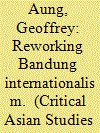

|
|
|
|
|
| Summary/Abstract |
This commentary examines how futurity has been imagined across politics and political economy in Burma/Myanmar. Three areas are discussed: the revolutionary horizons of anti-colonialists, who combined Buddhist and Marxist ideas of historical progress; the developmental socialism of the early independence area, with its industrial telos and modernist commitments; and a contemporary development project in southern Myanmar, where processes of dispossession are troubling earlier temporal imaginaries. I suggest that a vision of postcolonial transformation coheres across anti-colonial and early independence claims to futurity. This temporal imaginary, which I call postcolonial futurism, promises transitions from farm to factory, peasant to the proletariat, and precapital to capital. This imaginary resonated widely. Today, however, scholars of South and Southeast Asia argue that modernist promises of transition now lack empirical and political purchase amid ongoing dispossession and trends towards low-wage, informal labour. Yet in the wake of postcolonial futurism, responses to dispossession are creating novel political possibilities. Responding to Kuan-Hsing Chen’s call to rework Bandung internationalism in the present, I consider how struggles over dispossession today indicate both openings and limits for the making of new political futures. Integrating Glen Coulthard’s work on colonialism and dispossession, I argue that decolonizing subjectivity is central to this process.
|
|
|
|
|
|
|
|
|
|
|
|
|
|
|
|
| 10 |
ID:
123660
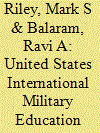

|
|
|
|
|
| Publication |
2013.
|
| Summary/Abstract |
Over the past 18 months, the U.S. Government has nearly normalized relations with the government of Burma 1
/Myanmar. The United States has recognized Myanmar government's recent reforms through reduced economic sanctions, placing an ambassador in Yangon, and encouraging continued progress through a recent (and first ever) visit by a President of the United States. As the United States considers additional enhancements to the relationship, the military relationship must be considered. The Myanmar military (otherwise known as the Tatmadaw) has either directly or de facto governed Myanmar for 53 of the 65 years since the country gained independence from Great Britain. The Tatmadaw is fully ingrained into the government's institutions and will arguably have a profound role in any progress (or backsliding) the country makes in economic and political reform. The question for the United States, then, is how best to positively influence the Tatmadaw officer corps. One part of the solution is to provide Tatmadaw officers with military educational opportunities in the United States. In fact, from 1980 to 1988, the United States funded 175 Tatmadaw officers' attendance at U.S. military schools. Reviewing the history of that 1980s program provides some perspective for restarting this program, especially in light of the recent changes occurring in Myanmar.
|
|
|
|
|
|
|
|
|
|
|
|
|
|
|
|
| 11 |
ID:
140789
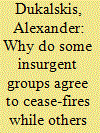

|
|
|
|
|
| Summary/Abstract |
This article uses Burma/Myanmar from 1948 to 2011 as a within-case context to explore why some armed insurgent groups agree to cease-fires while others do not. Analyzing 33 armed groups it finds that longer-lived groups were less likely to agree to cease-fires with the military government between 1989 and 2011. The article uses this within-case variation to understand what characteristics would make an insurgent group more or less likely to agree to a cease-fire. The article identifies four armed groups for more in-depth qualitative analysis to understand the roles of the administration of territory, ideology, and legacies of distrust with the state as drivers of the decision to agree to or reject a cease-fire.
|
|
|
|
|
|
|
|
|
|
|
|
|
|
|
|
|
|
|
|
|